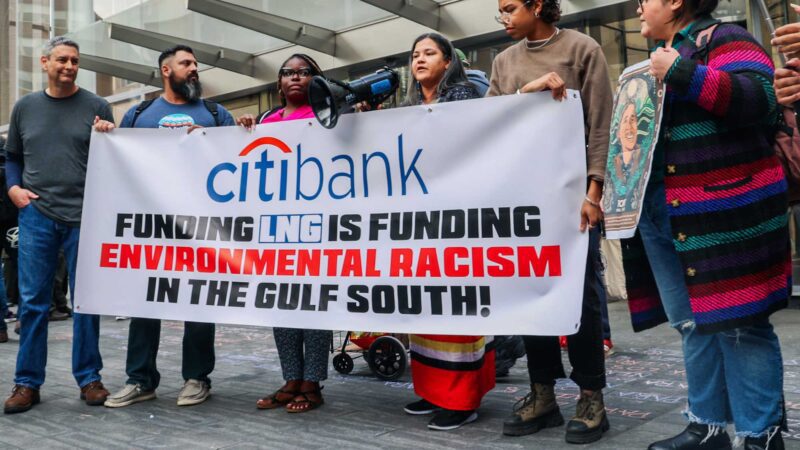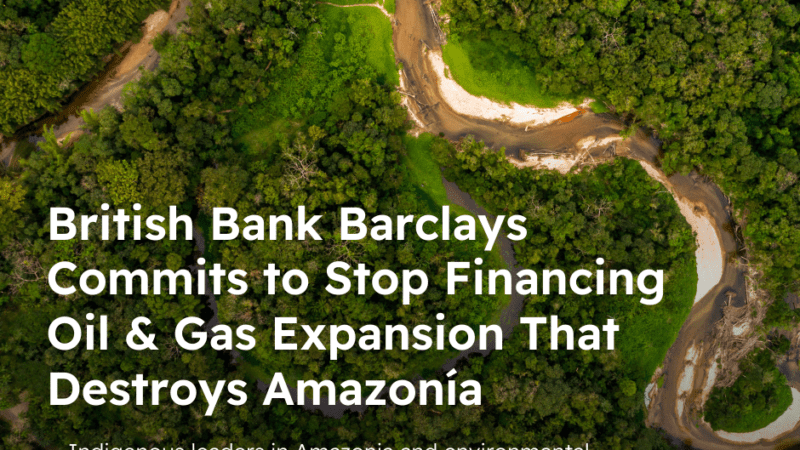Statement on BNP Paribas Pledge To End New Financing for Amazon Oil Drilling
May 4, 2022
Bank involved in industry deals worth 13.3 billion USD, move follows investigation by Stand.earth and Amazon Watch pushing firm to take a lead role in excluding Amazon oil and gas
San Francisco, CA —Yesterday, BNP Paribas became the first major bank to adopt a geographical exclusion of oil and gas from the Amazon rainforest. The commitment follows sustained pressure and engagement by Indigenous leaders and campaigners at Amazon Watch and Stand.earth since 2020. Through the Exit Amazon Oil & Gas campaign, advocates are demanding banks stop backing fossil fuel extraction in the world’s largest rainforest, given its biodiversity, cultural importance, and vital role in regulating the Earth’s climate. BNP Paribas’ pledge to “no longer finance or invest in companies producing out of oil and gas reserves in the Amazon” or in [companies] “developing related infrastructures” is a momentous move for the rainforest currently at a tipping point of ecological collapse. The bank has also committed to “no longer finance any oil and gas projects and related infrastructure in the Arctic and in the Amazon regions.”
If BNP follows through on its new commitment, it will have a significant impact on oil and gas operations on the ground in the Amazon. Soon to be released research by Stand.earth Research Group (SRG), in partnership with Stand.earth and Amazon Watch, reveals that BNP Paribas is involved in deals worth 13.3 billion USD for the oil and gas industry in the Amazon. This includes all loans and bond underwriting for active (open) deals and deals that have matured in the last 3 years.
The Confederation of Indigenous Nationalities of the Ecuadorian Amazon (CONFENIAE) President Marlon Vargas made the following statement in response to the pledge:
“BNP Paribas’s decision to stop financing new oil production in the Amazon is the first of its kind and a major milestone for us as Indigenous peoples. We are on the front lines in the forest, and live with the daily contamination, deforestation, and rights violations of the oil industry. This decision affirms what we have been calling for – that financing oil extraction in the Amazon is putting our lives, lands, and cultures at risk, and the health of our entire planet, and must stop. But we need other banks to follow suit. No one should be bankrolling oil extraction and destruction in the Amazon.”
Tyson Miller, Amazon Program Director at Stand.earth, made the following statement in response to the pledge:
“BNP Paribas’ commitment reinforces a growing understanding in the financial sector that oil drilling in the Amazon must end. Banks that are silent on this issue or continue to fund oil in the Amazon are out of touch with the immense climate, Indigenous rights, and biodiversity concerns that the world is facing.”
Pendle Marshall-Hallmark, Amazon Watch Climate Campaigner, made the following statement in response to the pledge:
“Banks are realizing that the fossil fuel industry is a terrible financial investment, linked not only to climate chaos and environmental devastation but also gross human rights violations. Frontline communities have borne the brunt of BNP Paribas’ history of support for the Amazon oil and gas industry, so this trail-blazing commitment to pull out of Amazon oil and gas is a wise and welcome one. We will be watching closely to see whether BNP Paribas actually excludes laggard companies that fail to decarbonize before the termination of their existing contracts.”
Background:
This updated commitment builds off of a January 2021 commitment from BNP Paribas, following a groundbreaking report from the Exit Amazon Oil & Gas campaign that highlighted over $10 billion USD in trade financing provided to Amazon oil by European banks. In response to this report, BNP Paribas pledged to immediately exclude new oil trade from the Ecuadorian coastal port of Esmereldas, the largest exporter of oil and gas from the western Amazon region.
Campaigners are concerned about whether the firm will sell its current holdings in oil and gas companies operating in the Amazon given that BNP Paribas’ Asset Management arm has been found to hold shares in GeoPark. GeoPark is a notorious Chilean oil company operating in the Putumayo region of the Colombian Amazon that has alleged ties to paramilitary groups terrorizing local campesino and Indigenous environmental activists. The situation in Putumayo is illustrative of a broader pattern tying support for the oil and gas industry in the Amazon to environmental and human rights violations throughout the rainforest.
In its pledge, BNP Paribas did not adopt the working definition of the “Amazon Biome” used by the Exit Amazon Oil and Gas campaign, defined by RAISG. Instead, it commits to exclude all financing and investment in new oil and gas projects located in regions designated as categories I to IV by the IUCN in either Brazil, Ecuador, Bolivia, Colombia, or Venezuela, or in the Amazon Sacred Headwaters region.
The bank has also stated that it will not exclude financing for oil and gas companies “with the most credible transition plans towards a net-zero economy by 2050.” BNP defined such “plans” as containing: a public commitment to align with a 1.5°C strategy; intermediary targets; a consistent capex program to back its diversification strategy away from fossil fuel production; a level of GHG emissions being measured and reported annually; strong leadership of the Board
Campaigners are wary that such vague criteria creates a loophole that will enable the bank to continue financing some of its largest oil and gas clients in the region. BNP Paribas must use the time remaining in its existing binding contracts to push clients to decarbonize and then follow through on its commitment to exclude if and when existing clients fail to adopt adequate transition plans within the remaining duration of their binding contracts.
Stand.earth and Amazon Watch launched the Exit Amazon Oil & Gas campaign after releasing the Banking on Amazon Destruction report. The report compared banks’ environmental and human rights policy commitments to the impacts of their on-the-ground financing and found that BNP Paribas was at “high risk” of driving Amazon destruction due to its investment exposure and participation in RCFs (Revolving Credit Facilities) in Amazon oil and gas. The report’s analysis found that BNP’s policies related to deforestation and Indigenous rights (including the right of Indigenous peoples to Free, Prior, and Informed Consent) were lacking, and pushed the bank to re-examine its exposure to companies with records of poor behavior in these areas.
###
Media contact:
Matt Krogh – US, mattkrogh@stand.earth, +1 360.763.4503 ext 203 (Pacific Time)


